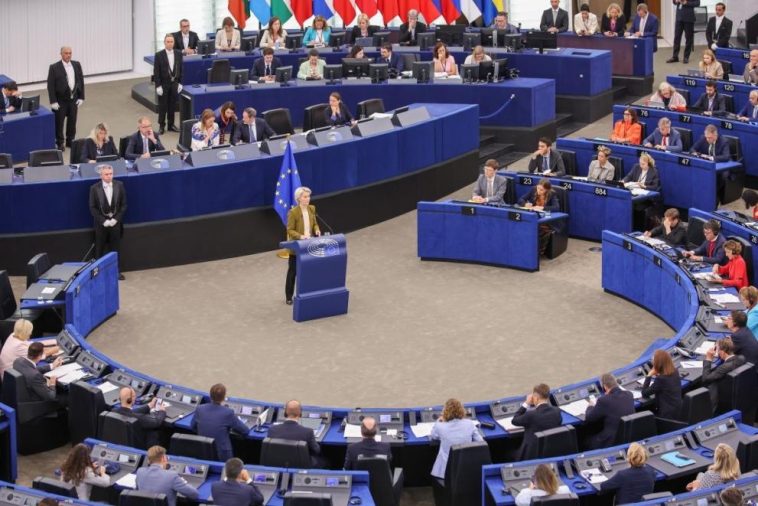
Uniting Europe in an Era of Global Challenges
Europe today finds itself at a crossroads—a juncture that demands unity, determination, and a collective effort to secure a future of freedom and independence. In a world where geopolitical tensions, economic uncertainties, and social pressures intertwine, it becomes essential for European nations to set aside differences and work together in order to overcome the tricky parts and tangled issues that threaten peace and prosperity.
This opinion piece examines diverse strategies that can help Europe steer through the current global challenges, from bolstering defence systems to nurturing innovation in digital and clean technologies. With stories of hardship and resilience, this analysis provides a balanced view of Europe’s path forward, emphasizing both the need for collaboration and the promise of a secure, united future for all its citizens.
Defending Freedom and Securing European Independence
At the core of Europe’s resurgence is the enduring fight for freedom—an effort not only to preserve the long-held values of democracy and independence but also to build a future that can withstand the overwhelming pressures of a world on edge. Leaders across the continent have repeatedly demonstrated that, when united, European nations can conquer even the most intimidating global challenges.
Recent events have underscored the pressing nature of this mission. With conflict zones emerging in Eastern Europe and crises intensifying in regions like Ukraine, Europe is compelled to intensify its focus on strategic independence. This means taking control over its defence, energy supplies, and technological capabilities rather than surrendering to external influences. Each step towards self-reliance is a tribute to the preserved spirit of liberty that has shaped Europe’s history.
Important lessons emerge from the stories of individuals caught in the crossfire of these global confrontations. Narratives like that of Sasha and his grandmother remind us that human resilience is a powerful driving force behind policy decisions. Their experiences place a personal face on the challenges of war and migration, urging European policy-makers to act decisively to ensure that freedom is safeguarded for every citizen.
Strengthening European Defence and Security Policy
In today’s tense global landscape, ensuring robust defence and security has become a key priority. European defence strategies must now address not just external threats, but also the internal divisions which can weaken the collective resolve. To truly secure our borders and our future, coordinated efforts must be launched across multiple fronts.
Central to this endeavour is the need for Europe to invest in modern defence capabilities. This includes enhancing the use of drones, boosting cybersecurity frameworks, and building independent intelligence networks that can detect and counter emerging dangers. For instance, the proposal for a new “Qualitative Military Edge” program illustrates how innovative thinking can turn raw industrial might into a decisive strength on the battlefield. While ingenious solutions provided Ukraine with extra leverage through drone technology, coordination across European nations remains essential to ensure that such advancements are applied broadly and effectively.
- Develop a multi-billion euro investment plan for future military technologies.
- Foster joint industrial initiatives between member states.
- Create dedicated research centers to explore the fine points of modern warfare.
- Strengthen supply chains to ensure uninterrupted production of sophisticated defence tools.
Adopting these measures calls for every nation to figure a path that both values independence and reinforces European solidarity. A serious commitment to coordinated policy-making will help Europe meet the overwhelming challenges posed by an increasingly unpredictable world.
Energizing a Resilient European Economy
Energy security remains one of the most critical issues in the current geopolitical climate. With the global market showing signs of strain and the effects of an ongoing energy crisis becoming more pronounced, Europe must work through the tangled issues that threaten its prosperity. The need to phase out dependency on external fossil fuels is now more pressing than ever.
Steering through these tricky bits calls for transformative energy policies. By dismantling outdated infrastructures and ramping up investments in renewable energy, Europe can achieve two important goals simultaneously: reducing its carbon footprint and increasing its autonomy over energy supplies. This means prioritizing investments in homegrown renewables and modernizing grid infrastructures with new programs like “Energy Highways,” designed to address bottlenecks and ensure a stable supply in every region.
Here are some essential strategies to further energy independence:
| Key Measures | Expected Benefits |
|---|---|
| Phasing out imported fossil fuels | Reduced external dependencies and lower energy bills |
| Investing in renewable energy sources | Enhanced energy security and sustainable long-term growth |
| Modernizing grid infrastructure | Increased efficiency and reduced disruptions |
| Developing strategic interconnectors | Improved cross-border energy cooperation |
While the economic challenges are substantial, the rewards of these investments are super important, promising not only a more stable energy future but also economic growth, reduced environmental impact, and a boost to national independence.
Advancing Innovation in Digital and Clean Tech
Today’s competitive economic environment demands that Europe be at the forefront of digital and clean technology. Innovation in these sectors is not just about keeping pace with global trends—it is about crafting a future where dependency on external forces is minimized and where homegrown industrial and technological capabilities drive growth.
To meet this objective, Europe has set ambitious targets. Massive investments in digital infrastructure, artificial intelligence, and next-generation clean tech are being backed by both public funds and private investments. Initiatives such as the “European AI Gigafactories” and the new Scaleup Europe Fund are aimed at nurturing startups in key technological fields to compete on a global scale.
Considering the accelerating pace of industrial mass production, it is crucial that Europe support its domestic innovation. By turning raw ingenuity into industrial success, the region can build competitive strengths that will defy the pull of external markets. Here are the key areas receiving focused attention:
- Digital Transformation: Modernizing digital frameworks to support emerging business models across industries.
- Clean Technology: Investing in battery production, electric vehicles, and green manufacturing processes.
- Research and Development: Doubling programs like Horizon Europe to feed the pipeline of innovative start-ups.
- Industrial Partnerships: Collaborating with private investors to create large-scale manufacturing hubs in critical tech areas.
Digging into these initiatives reveals a clear vision: a Europe that sets benchmarks in sustainability and tech sovereignty. With a focus on the little details—the fine shades that differentiate success from failure—Europe can become less reliant on global supply chains and more in control of its own destiny.
Safeguarding Europe’s Single Market and Industrial Future
The European Single Market stands as one of the greatest achievements of the continent—a common platform that spurs economic growth and supports millions of jobs. However, many subtle parts of the single market still require attention. According to recent studies, internal barriers are equivalent to exorbitant tariffs that hamper trade and growth.
Addressing these issues involves cutting through the confused bits of regulatory overlaps, paperwork, and other obstacles that steeply burden businesses. A new Single Market Roadmap is on the horizon, designed to pave the way for major improvements in finance, energy, telecommunications, and other fields. The focus is on delivering measurable, actionable targets that can truly lift European competitiveness.
Key steps include:
- Streamlining cross-border regulations to reduce bureaucracy.
- Enhancing digital payment systems and introducing a digital Euro to facilitate smoother transactions.
- Revamping the industrial policy to offer a level playing field for local businesses.
- Implementing initiatives such as the Small Affordable Cars program to support domestic manufacturing.
These measures are seen as not only essential for sustaining the Single Market but also critical for reinforcing Europe’s industrial future, ensuring that European companies remain competitive while creating a robust internal economic ecosystem.
Championing Social Justice and Affordable Living for Europeans
Economic policies must always be balanced by social measures that ensure the benefits of growth are shared equitably among citizens. Increasing housing costs, escalating energy bills, and growing income disparities have left many Europeans feeling overwhelmed. In such an environment, investments in social justice become a key priority.
Across Europe, housing affordability is a growing concern. Rising house prices and a decline in the issuance of building permits threaten to deepen the social crisis. In response, proposals for a European Affordable Housing Plan are emerging, aimed at ensuring safe, affordable homes for everyone—from teachers and nurses to young families starting out.
Additional social measures on the agenda include:
- Launching ambitious anti-poverty strategies designed to eradicate extreme poverty by 2050.
- Implementing a strong Child Guarantee to protect vulnerable families.
- Introducing financial assistance packages to help with the cost of living, particularly for energy and essential products.
- Revamping policies on employment to ensure that modern jobs come with fair wages and job security.
By taking the wheel on these initiatives, European leaders can ensure that economic reforms translate into improved living conditions and a fairer society for all citizens.
Rebuilding Trust in European Democracy and Media Independence
Democracy in Europe is facing subtle challenges, from political divisions to the spread of disinformation. Independent media are an essential part of a healthy democracy, but many regions in Europe are witnessing the decline of local journalism—a trend that can sap trust in public institutions.
To get around these issues, policies aimed at reinvigorating independent journalism and media literacy have come to the fore. Proposals for a Media Resilience Programme are being put forward to support trustworthy news sources and counteract the spread of misleading information on social media platforms. Additionally, the establishment of the European Centre for Democratic Resilience will help monitor and contest propaganda and manipulation, which have become increasingly nerve-racking for policymakers and citizens alike.
A few measures being considered include:
- Substantial funding for independent media and local journalism initiatives.
- Partnerships with social media companies to restrict harmful online content and the promotion of youth safe practices online.
- Educational programs on media literacy to enable citizens to distinguish real news from disinformation.
- Strengthening legal frameworks to protect journalistic freedom and foster transparency in government communications.
Rebuilding trust, therefore, is not just about reacting to current challenges, but also about building resilient structures that allow democracy to thrive despite the overlapping pressures of a turbulent world.
Balancing Global Trade and Strategic Partnerships for Europe
As the global trading system evolves, Europe continues to play a pivotal role in shaping international economic policies. Our relationship with key trading partners—especially with the United States—has a significant influence on the future of European markets. However, even amidst the promise of favourable new agreements, Europe must stand firm in setting its own standards.
An upcoming trade strategy focuses on keeping market access stable while safeguarding European companies against unfair competition. This approach not only highlights the importance of sustaining existing agreements with countries like the United States, but also underscores the necessity of diversifying trade relationships with emerging markets such as India, Mexico, and nations involved with the CPTPP.
In balancing global trade, European policymakers are also looking at:
- Developing a coalition of like-minded countries to reform and modernize the global trading framework.
- Ensuring that innovative European products can successfully compete against cheaper imports from regions with lower production costs.
- Negotiating deals that safeguard intellectual property and adhere to environmentally friendly standards.
- Utilizing trade instruments that level the playing field for Europe’s industry, particularly in key sectors like steel, chemicals, and automotive.
This balanced approach to global trade not only enhances economic security but also reflects a broader commitment to a diversified and resilient European economy. By making strategic partnerships and advancing new trade frameworks, Europe can both open up new markets and protect its existing industries.
Conclusion: The European Path Forward
Looking ahead, Europe must combine strength, innovation, and unity to ensure a future where freedom, prosperity, and stability prevail. The path forward involves tough decisions—addressing the small distinctions that complicate policies, investing in new technologies, and supporting the communities that form the backbone of the continent. Every economic reform, defence strategy, and social measure reflects Europe’s determination to remain independent and secure in these nerve-racking times.
This editorial has outlined the key areas that demand our collective focus—from the tricky parts of modern defence strategies to the overwhelming challenges of energy security. It is clear that managing our way through these issues requires not only political will but also a dedication to civic responsibility and a deep respect for the values that have built modern Europe.
Success in these endeavours requires active collaboration among governments, industry leaders, and citizens. Whether it is through investing in digital and clean tech, simplifying the internal workings of the Single Market, or reinforcing the principles of social justice and media independence, every step counts. Europe’s strength lies in its ability to work together, transforming raw ingenuity into tangible progress.
Every story of individual courage—whether from the battlefields of Ukraine or the communities affected by rising living costs—serves as a powerful reminder that the fight for Europe’s future is both a collective and personal challenge. By pushing forward with smart policies and innovative ideas, Europe can forge a path that respects its heritage while looking boldly into the future.
Ultimately, the journey to a more independent Europe is about ensuring that all citizens have the freedom to choose, to innovate, and to thrive in a truly united community. The call to action is clear: we must trade division for collaboration, hesitation for decisive leadership, and fragmentation for unity. Only then can Europe realize its full potential as a beacon of freedom, creativity, and resilience in a rapidly changing world.
In these testing times, Europe’s commitment to securing its future through robust policies in defence, energy, trade, and social welfare is not only necessary—it is essential. The promise of a united Europe, built on the pillars of independence and innovation, stands as a testament to the continent’s enduring spirit. The road ahead will have its twists and turns, and progress may sometimes seem slow. However, every initiative, every investment, and every collaborative effort brings us one step closer to a future where Europe is not only surviving but thriving on its own terms.
Let us embrace this challenge with the same determination that Europe has shown throughout its history. Through open dialogue, innovative thinking, and unwavering unity, Europe can navigate through these tricky and intimidating times. The shared vision of a free, prosperous, and secure Europe is within reach—and it is up to all of us to ensure that future generations inherit a continent that stands resilient and proud in the face of any challenge.
Originally Post From https://enlargement.ec.europa.eu/news/2025-state-union-address-president-von-der-leyen-2025-09-10_en
Read more about this topic at
European Commission
State of the Union 2025: Europe’s Independence Moment


